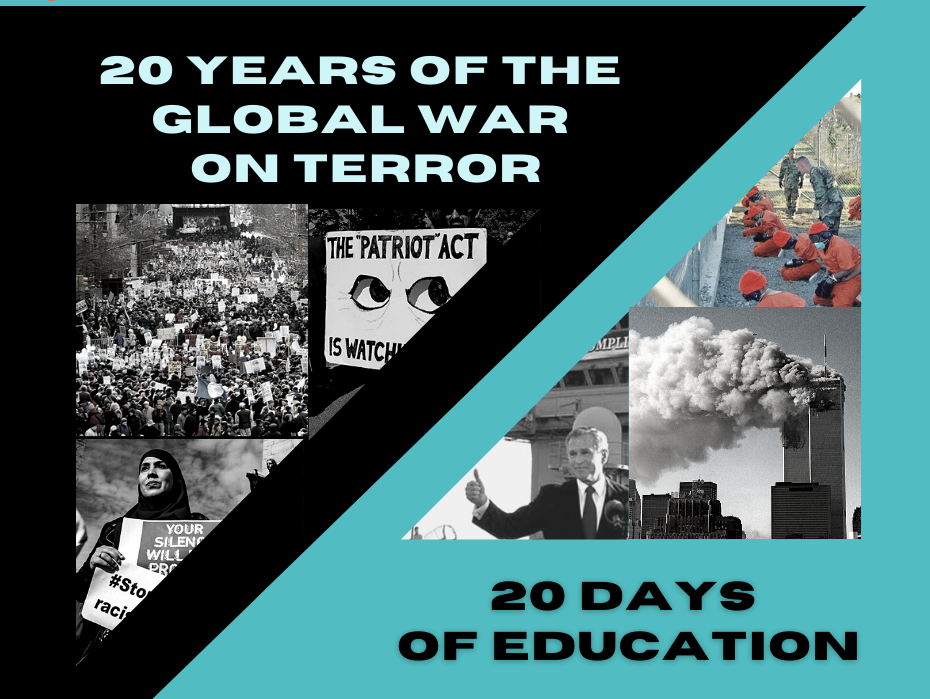It has been 20 years since the launch of the so-called “Global War on Terror” by George W. Bush on September 16th, 2001. One of the primary characteristics of this truly global war waged by the U.S. is how invisible it has been made to those who are not targeted by it– by design of the warmakers, and with cooperation from the media.
As Catalyst Project considered how to reflect on the impacts of 9/11 and the “Global War on Terror,” there wasn’t a singular story we could tell to capture the past 20 years of attacks and resistance.
Our series: “20 Years of the ‘Global War on Terror,’ 20 Days of Education and Resources” is a collection of snapshots (articles, speeches, interviews) highlighting many of the impacts. The series provides resources that offer analytical framing and historical perspective. We offer these resources to support new generations of organizers to get grounded in the legacies of fighting U.S. imperialism and the lessons learned along the way.
This page will be updated each day with the new resources: https://collectiveliberation.org/resources/20-years-20-days/
Day 6: The global anti-war movement
As long as the U.S. empire has waged wars, people have resisted them from both inside and outside the empire. The global mobilization to prevent the invasion of Iraq was a high tide of resistance. On February 15th, 2003 an estimated 12-14 million people took part in protests on every continent. in the largest day of protest in history. On the day after the Bush administration launched the massive Shock and Awe bombing campaign on Iraq, protesters in cities across the U.S. attempted to stop business as usual and raise the social cost of waging war. In San Francisco alone more than 2,500 people were arrested over several days of action that shut down the city’s financial center.
The scale of the antiwar movement was incredible, and it wrestled with many issues internally. Two of the key ones were its shortcomings around antiracism and anti-imperialism. We must reckon with the fact that the movement was unable to prevent the invasion of Iraq, as we also remember the incredible resistance to U.S. war-making and lift up some of the organizations that continue to organize powerfully against US war and imperialism: Dissenters, Arab Resource and Organizing Center, Palestinian Youth Movement, About Face: Veterans Against the War, War Resisters League.
Today’s resources:
- February 15th, 2003. The Day the World Said No To Warby Phyllis Bennis
- The Largest Protest Ever Was 15 Years Ago. The Iraq War Isn’t Over. What Happened? by Paul Blumenthal
- Protests against the Iraq War – Wikiwand
- SHUTDOWN: The Rise and Fall of Direct Action to Stop the War
- Iraq, the US and the Challenges to the Global Peace Movement by Walden Bello
Day 7: Hybrid War
One of the essential elements of the War on Terror is the use of hybrid warfare. This type of warfare blends conventional warfare (boots on the ground, drones) with other methods, such as sanctions, deceptive news, diplomatic power, electoral intervention, and the use of the economic power of institutions such as the International Monetary Fund and the World Bank. These methods allow the U.S. to remain in the background, masking its interventionism as it pursues its goal of regime change in countries opposed to U.S. policies. Far from being a “softer” form of warfare, tactics like sanctions are incredibly violent, causing massive suffering of civilians and costing millions of lives.
What do you think would be different if the majority of people in the U.S. understood more about these wars and their effects at home and abroad?
Primary Resource: Vijay Prashad, “Hybrid Wars and US Imperialism”
Additional Resources:
- Iranians Will Not Forget. The Hybrid War Against Iran.
- Sanctions Against Iran: A Duplicitous “Alternative” to War
- S. and Allies Wage “Hybrid War” Against Venezuela
- Coronashock and the Hybrid War against Venezuela
Organizations: The Black Alliance for Peace, Tricontinental: Institute for Social Research, Women Against Sanctions, War and Militarization of Middle East
Outline of 20 Years of the “Global War on Terror” / 20 Days of Education and Resources
Here is the list of topics for each day of this educational series:
- 9/11/2001
- “Special Registration” and Islamophobia
- Background of US in the Region
- Afghanistan
- Iraq
- The Global Antiwar Movement
- Hybrid Warfare
- Palestine
- Environmental Impacts
- Architects and Enablers
- War Profiteers
- Counter Recruitment and GI Resistance
- Normalization of Torture
- Surveillance State
- Immigration
- War on Terror and Rise of the Far Right
- “Countering Violent Extremism” and Shifts in Policing
- Imperialist “Feminism” and Homonationalism
- Women of Color Leadership – Here and Abroad
- Ending the “Global War on Terror”
- Towards Demilitarization
